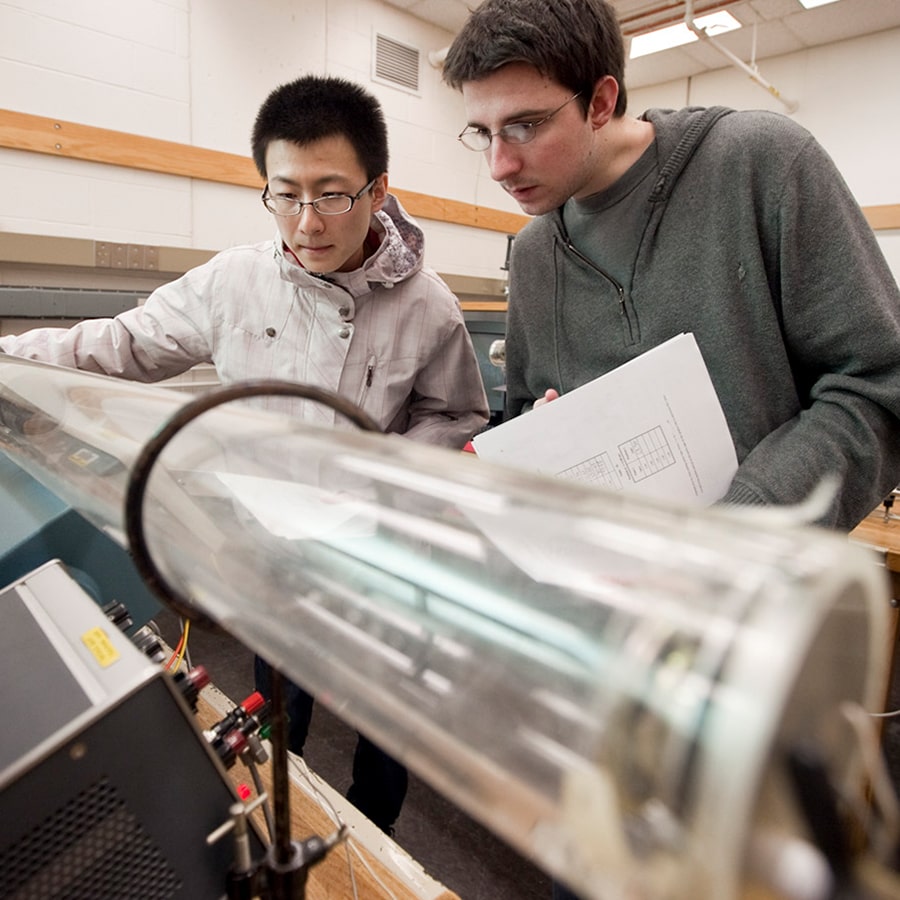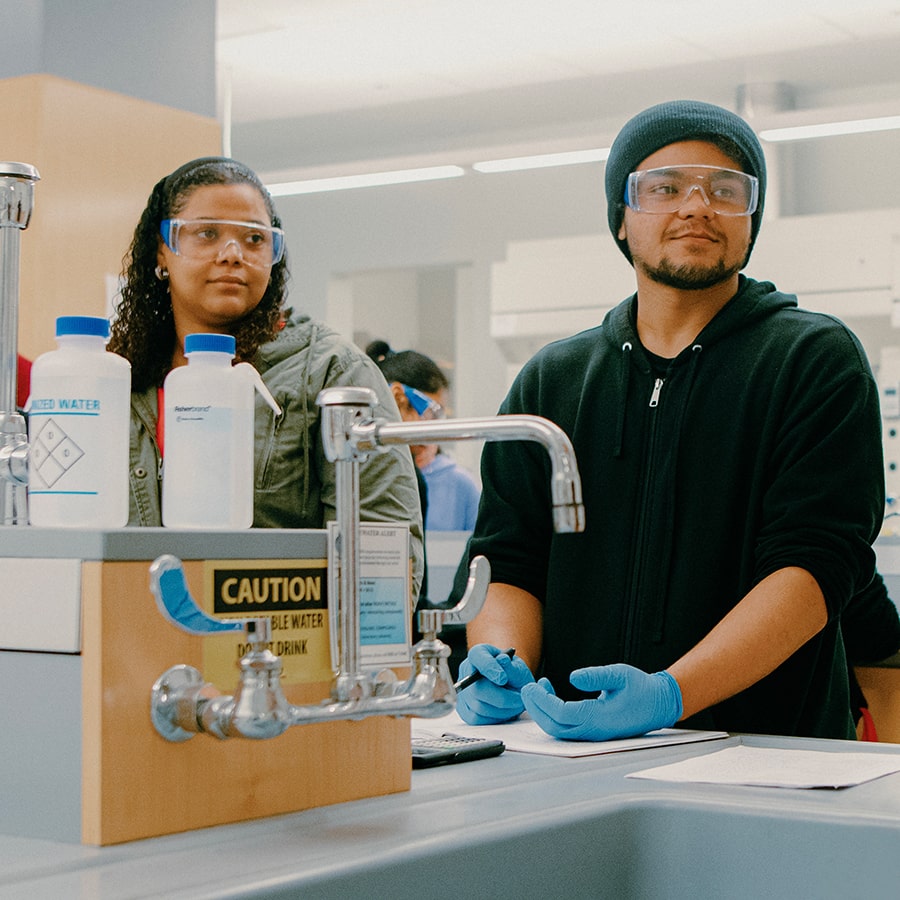Plan Your Education
How to Apply
Applicants must meet general graduate admission requirements in addition to the following program-specific requirements:
- A minimum, cumulative GPA of 2.75 on a 4.0 scale (or international equivalent) in all undergraduate work
- A bachelor’s degree from a regionally accredited U.S. institution of recognized standing or an international equivalent at the time of enrollment
- Familiarity with Physics at the level of upper-level undergraduate work is expected
- A grade of B or higher in calculus and higher-level math classes such as linear algebra, ordinary differential equations, partial differential equations, and complex analysis
- Statement of Purpose - a personal statement spelling out career goals and interests in the applied physics degree
- Résumé
- General GRE is required
- While the GRE Physics subject test is not required, it is strongly recommended, as it allows for normative comparisons
- Official transcripts for all institutions where you have earned more than 6 credits. If your transcript is in a language other than English, please include an English translation, validated by an official public translator.
- Three letters of recommendation. Letters from non-academic associates are accepted, but at least one letter must speak authoritatively to the student’s academic preparation.
- Applicants who completed the majority of their undergraduate coursework outside of the United States are typically required to submit official TOEFL, IELTS, PTE or Duolingo English proficiency test scores.
Deadlines & Cost
Deadlines: February 15 for fall
Application Fee: The nonrefundable application fee is $75. UMass Boston alumni and current students that plan to complete degree requirements prior to graduate enrollment can submit the application without paying the application fee.
Estimate Your Program Cost: Get a feel for your expected program costs using the Graduate Program Cost Calculator.
Program Cost Information: For more detailed information on costs, please visit the Bursar's website.
Curriculum
Laboratory/Applied Courses (12 Credits)
Complete three from below.
- PHYSIC 600 - Electronic Instrumentation I: Analog 4 Credit(s)
- PHYSIC 601 - Electronic Instrumentation II: Digital 4 Credit(s)
- PHYSIC 602 - Laser Optics Laboratory 4 Credit(s)
- PHYSIC 632 - Advanced Laser Optics (with Lab) 4 Credit(s)
- PHYSIC 607 - Experiments in Squishy Physics 4 Credit(s)
- PHYSIC 610 - Topics in Medical Imaging 4 Credit(s)
- PHYSIC 697 - Special Topics in Applied Physics 1-8 Credit(s) (with approval of the graduate program director)
Theory Courses (12 Credits)
Complete three from below.
- PHYSIC 611 - Theory of Classical Mechanics and Fluid Mechanics 4 Credit(s)
- PHYSIC 612 - Electromagnetic Theory 4 Credit(s)
- PHYSIC 613 - Quantum Mechanics, Atomic, and Molecular Physics 4 Credit(s)
- PHYSIC 614 - Thermodynamics and Statistical Mechanics 4 Credit(s)
- PHYSIC 616 - Mathematical Methods for Physicists 4 Credit(s)
- PHYSIC 635 - Physics on the Back of an Envelope (Estimation in Physics) 4 Credit(s)
- PHYSIC 638 - Quantum Measurement Theory 4 Credit(s)
- PHYSIC 645 - Cancer Biophysics 4 Credit(s)
- PHYSIC 697 - Special Topics in Applied Physics 1-8 Credit(s) (with approval of the graduate program director)
Elective (4 Credits)
Complete one additional laboratory/applied or theory course from above.
Thesis or Internship Course (6 Credits)
In exceptional cases, with prior approval of the program, a student may graduate with nine courses (substituting two additional courses for the internship or thesis requirement). These courses must be chosen as a coherent subject of specialization in an applied area of special interest to the student.
- PHYSIC 694 - Master’s Internship 3-6 Credit(s)
or - PHYSIC 699 - Master’s Thesis Research 1-6 Credit(s)
For more information on curriculum, including course descriptions and degree requirements, visit the Academic Catalog.
Learning Outcomes
- Students acquire appropriate competence in physics foundations and have been given a working knowledge of methodologies in a wide range of sub-fields in modern physics.
- Students acquire competence in laboratory skills and can work independently.
- Students acquire the ability to select from an array of analytic and computational tools to solve specific problems.
- Students are able to scientifically justify this decision and gauge its efficacy.
- Students acquire competence in laboratory skills and can work independently.
- Students acquire the ability to select from an array of analytic and computational tools to solve specific problems.
- Students are able to scientifically justify this decision and gauge its efficacy.
- Students demonstrate the ability to extend ideas from one area of physics to problems in other areas or disciplines.
- Students are broadly aware of the challenging and open problems of the day.
- Students are encouraged to engage in research at the earliest opportunity.
- Students can relate and articulate the connections between abstract theoretical constructs and reality. For our Masters students we seek to give them significant theoretical and experimental skills to prepare them for employment in the knowledge economy. Some students in this category, particularly foreign students, use this training as bridge between their undergraduate studies and a doctoral program.
- At the graduate level, we also seek to create a path that allows students from non-physics backgrounds to be trained in physics. This allows us to recruit strong students from outside the traditional Physics pipeline. Furthermore, it creates an opportunity for students who discover their vocation late to re-enter the Physics education system.
- Students acquire appropriate competence in physics foundations and have been given a working knowledge of methodologies in a wide range of sub-fields in modern physics.
- At the graduate level, we also seek to create a path that allows students from non-physics backgrounds to be trained in physics. This allows us to recruit strong students from outside the traditional Physics pipeline. Furthermore, it creates an opportunity for students who discover their vocation late to re-enter the Physics education system.
Graduation Criteria
Complete 34 credits from eight courses, including three laboratory/applied courses, three theoretical courses, one elective, and one thesis or internship course.
Capstone: Completion of a master’s thesis or internship.
Statute of limitations: Six years.
Contact
Graduate Program Director Chandra Yelleswarapu
chandra.yelleswarapu@umb.edu
(617) 287-6063
Administrative Assistant Danielle Fontaine
danielle.fontaine@umb.edu
(617) 287-5536

Department of Physics
Learn more about UMass Boston's Physics department, our research, and our faculty.
Explore the Department of Physics
College of Science & Mathematics
Learn more about the faculty, research, and programs that make up our College of Science and Mathematics.
Explore Now